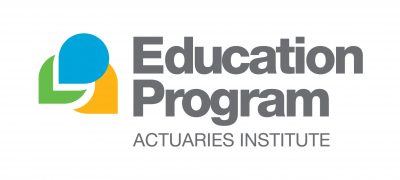
Educating Actuaries of the Future
Following a joint session at the Actuaries Summit, member of the Diversity and Inclusion Working Group, Simone Collins, highlights key updates to the new education program that aims to help our students become more flexible and employable.
The June 2019 Actuaries Summit featured a joint panel session with the Actuaries Institute’s (Institute) Diversity and Inclusion Working Group (DIWG) and the Institute’s Education team. This session explored the important skills that will be needed by the actuary of the future. It also discussed the ongoing revamp of the education system, which is designed to provide aspiring actuaries with these skills.
The key theme that the panellists discussed was the importance of communication skills for actuaries. Increasingly, machines can do the ’number-crunching’ part of actuarial jobs. This means that it is no longer sufficient for actuaries to just have technical skills. Rather, we need to be able to tell the story behind the numbers.
When asked what employers value, it was those soft skills of analysis, decision making, persuasion and judgement. Equally important is an ability to work with stakeholders with a diverse range of backgrounds and technical knowledge. Feedback from employers on actuarial candidates is often that they have great technical skills, but that they need to be able to better influence and communicate with stakeholders.
The Institute has an ongoing project of changes to the education program. One of the reasons the upcoming changes have been designed is to develop these communication skills for actuarial students at a much earlier stage in their education process. The new program includes a ’Communication, Modelling & Professionalism‘ module. This module takes concepts from the current Professionalism and Commercial Actuarial Practice courses but delivers them prior to students undertaking the Fellowship exams.

The new module will focus on skills like addressing reports to their intended audience, presentation skills and making reports more coherent and professional. A common issue that employers have identified is that actuarial students don’t know how to write reports or communicate in a professional manner. The aim of this course is to address this concern and so increase the employability of actuarial students.
Another focus of the education changes is making the courses more modern and flexible. The courses will be more principles based. The aim of this is to move students away from a focus of providing the correct answer, and instead be able to take stakeholders on a journey with many possible answers. Judgement and flexible thinking are skills that can be transferred to a wide range of jobs. Developing these skills will ensure that actuaries are well positioned to undertake the jobs of the future, whatever they may be.
The other key discussion point of the session was that learning shouldn’t cease when actuaries have completed their exams. The world is moving so fast that it is critical for actuaries to read widely and be adaptable. We should speak up and try something different in the workplace. For example, putting your hand up to substitute in another area when someone is on leave, or taking an opportunity in a different role or different country. The further these opportunities are from your current role the better – if you work in risk then try sitting in a sales role for a few weeks!
Overall, the DIWG and the Institute’s Education Team are focussed on keeping the profession relevant into the future. We might not know what an actuarial job will look like in the future. However, if we can develop actuaries’ flexibility and judgement, and encourage people with a diverse range of skills and backgrounds into the profession, then we will be well placed to add value in this fast-changing world.
Thanks to Jan Swinhoe, Lesley Traverso and Mike Callen for their insightful comments in this session, and to Jenny Lyon for facilitating the discussion.
CPD: Actuaries Institute Members can claim two CPD points for every hour of reading articles on Actuaries Digital.






